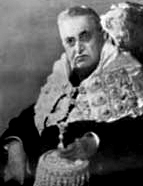

Born in Gondim, in Minho, the son of farmers, José Maria Rodrigues began his studies late. It was only in 1866, thanks to an inheritance from Brazil, that he had his first teacher, in Valença – Canon Vaz, whose lessons prepared him for the primary school exam (12 May 1870) and for admission to secondary school (2 July 1870). JMR took all these exams in Braga, the city where he would enter the seminary and where, in 1880, he was ordained a priest. He immediately became chaplain at the University of Coimbra, where he had begun studying law in 1878. The reason why he abandoned it in 1881 to study theology is a matter of speculation. What is certain is that he was an award-winning student, with texts readily published in Civilização Católica (1881-1882); a polemicist with Camilo Castelo Branco in 1882-1883; author of a dissertation on “Positivism and Morality”, published in O Instituto between 1884 and 1885, as well as a bold intervention with regal connotations, which was censored by the Roman Congregation of the Holy Office but refined by influential figures from his alma mater and soon – with sponsorship? – published (A Faculdade de Theologia e As Doutrinas que Ella Ensina, 1886); doctorate on 5 February 1888, JMR thus auspiciously completed the first stage of his life’s journey, which later extended to Lisbon.
In Coimbra, after obtaining his doctorate, JMR became a substitute lecturer and secretary of the Faculdade de Teologia [School of Theology]. He was also librarian at the University. Teaching at a higher level was not his first experience in education, nor would it prevent him from gaining further experience. Enjoying the trust of Jaime Moniz, JMR not only collaborated in defining the plan for the reform of secondary education (1895), but, at the invitation of the Minister of the Kingdom, João Franco, he was called upon to play a key role in its implementation. Between 1895 and 1902, JMR was headmaster of the Carmo secondary school, and the impression he made in this role led to another appeal, which he accepted: to be tutor in Latin and Portuguese to Prince Luís Filipe and his brother, the future Manuel II.
This work is financed by national funds through FCT - Foundation for Science and Technology, I.P, in the scope of the projects UIDB/04311/2020 and UIDP/04311/2020.
